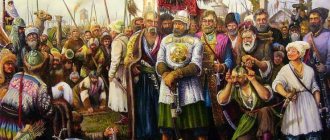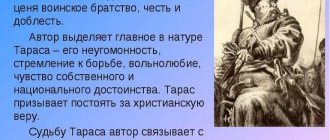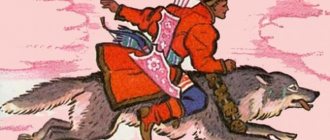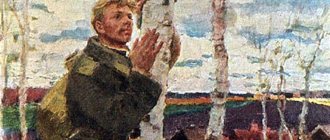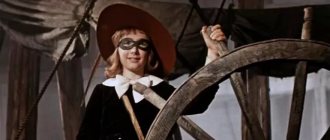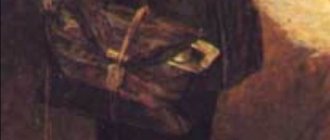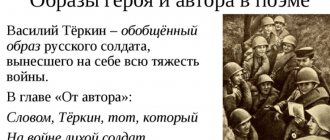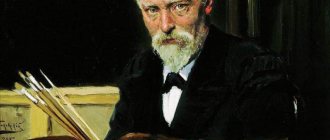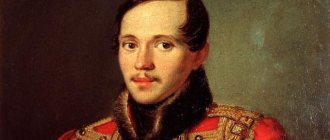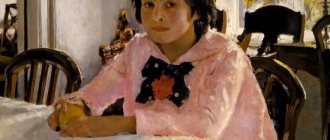- Essays
- On literature
- Gogol
- Description of Manilov's house and estate (estate, interior)
The author of the novel “Dead Souls” Nikolai Vasilyevich Gogol gives a description of the estate of the landowner Manilov in the second chapter. The description is preceded by a story about Chichikov’s wandering in order to find Manilovka.
Manilov gave Chichikov a somewhat embellished idea of his estate and it was located further in distance than the owner of the estate had said. Approaching the estate, Chichikov saw the building of a large stone house standing alone. It was located on a hill and was surrounded by flower beds with lilacs in the English style.
Here, near the house, there was a pond, in which the guest was surprised to see two women catching fish with nets. Chichikov was also struck by the fact that there was no vegetation at all in the surrounding area, only huts made of wood. The entire landscape was full of impracticality and mismanagement, and at the same time there were buildings “like everyone else’s.”
On the porch of the stone house, Manilov was waiting for the guest, opening his arms in a hospitable gesture and smiling sweetly at Chichikov.
The guest also noticed a green gazebo with the inscription “Temple of Solitary Reflection.” The gazebo was overgrown and dilapidated, but Manilov was proud of his temple, which reflected his subtle spiritual structure. In Chichikov’s opinion, the pond that the landowner started as a tribute to fashion was just as useless.
The Manilovs are deep dreamers. At the same time, their life was completely unsettled. There were some discussions about the need to buy furniture. Judging by the interior, which consisted of unupholstered armchairs with only matting on them, the unfinished furnishings of the house had been going on for several years. The situation revealed the laziness and impracticality of the owners of the estate, while the Manilov landowners had good incomes.
Along with beautiful and expensive items in the interior of the house there were cheap and unsightly ones.
There was even a master's office in the house, again as a tribute to fashion, since Manilov did not pay attention to the management of the estate, leaving the management of affairs at the disposal of the servants. The landowner used the office to spend time in thought over a pipe of tobacco. Manilov lovingly arranged piles of tobacco in neat rows during moments of long thought.
On the office table there was a book with a bookmark in the place that the owner of the office had been reading for the second year.
The description of Manilov’s estate reflects the very existence of such people - emptiness, inactivity, daydreaming and laziness.
Essay House of Manilov
In this description and, they say, everywhere in life, houses look like their owners. The estate is like an extended house. Here little attention is paid to the economic part (both by the author and Manilov himself), but there is a temple of solitary reflection - a gazebo. Green dome, blue columns - beauty!
The gazebo, of course, is the most important place here - this is where the owner can dream in the fresh air. Both pleasant and useful! On the territory of the estate there is an overgrown pond, a rather dull forest... But there was enough sweetness in the owner himself, in his relationship with his wife. They even spoke in sweet voices.
Little attention to the economic part leads to the fact that the serfs are lazy and drink. But something, of course, is being done. Chichikov sees two women carrying a catch: crayfish and fish. People don't feed on fantasies! It is also mentioned that Manilov responds to all his clerk’s proposals while smoking his pipe with agreement. That is, the owner, in principle, is not against the fact that something needs to be done on the estate. But it turns out that everything depends on this clerk - does he care about the estate, does he steal... The cook steals them, the men deceive, but the Manilovs don’t pay attention! The landowner himself does not go to the fields at all.
Although it is said that there are quite a lot of peasant houses here. Chichikov even points out that they are quite strong, but there is no greenery around the houses - at least one tree! There are only logs everywhere, but the master's house is stone - two-story. In the Manilovs’ house, it doesn’t bother them that for several years now they haven’t ordered upholstery for two armchairs, which spoil the appearance of the living room. And the owner continues to warn guests that the chairs are not ready.
The Manilovsky garden is called English, that is, made in this manner. Probably fashionable. Everything is a little stunted, not entirely well-groomed. There are several flower beds, several birch trees, lilacs. The lawn is mowed! The house is located on a ravine, that is, it is open to all winds - not everything is completely solid, it’s more beautiful. I think that this just reflects the character of the owner. The house seems to be separate from all these rude peasants, and even higher - exactly Manilov’s description. He definitely shunned his simple peasants and felt superior to them. It’s good that he didn’t plan, as in one film, to teach them Latin! Although, I think that Manilov had enough of his dreams. But he named his sons in a unique way. I remember one, Alcides!
I think that Manilov has little energy - he spends it on empty fantasies. And there are problems with motivation...
Manilov's manor house - the image, habits of the hero
The former officer was recognized by society as a cultured, highly educated person. Every appearance in the world is a kind of test for him. He studies the habits of wealthy gentlemen, adopting their qualities. Basic facts about the hero:
- The character constantly smokes a pipe, citing a military habit;
- The man is happily married to Lizonka. Their marriage is almost nine years old, and people have maintained tenderness and mutual respect. The family has two sons of almost the same age - 6, 7 years old;
- Laziness prevents the hero from achieving his goals in life. Fate taught him a lesson, but Manilov is not ready to deal with everyday life, solve problems, or leave the familiar world of dreams;
- The character is presented as a typical rich gentleman. Outwardly kind, ingratiating, handsome hero is boring and uninteresting in communication. The absence of an inner core makes him driven, characterless;
- The landowner has no desire to argue, to prove that he is right. The best way to deal with problems is to retreat into your own reality, dreams;
- The character is characterized by being in prostration; he abstracts himself from reality, dreaming about his unrealizable projects.
Description of the house
The first thing that caught Chichikov’s eye was the green gazebo, which reveals the entire nature of the owner . The inscription “Temple of Solitary Reflection” could be seen on it. The gazebo was a little dilapidated, but Manilov was very proud of it, because he seriously believed that this structure emphasized his delicate nature. Another detail characterizing the owner was the pond. He was educated here as a tribute to fashion, but did not bring any benefit. As the author says, such ponds were not uncommon on estates at that time. “Everything is like everyone else” is the hidden motto of the owner of Manilovka.
However, this family had one distinctive feature: drowning in fun and dreams, the spouses never managed to properly decorate their home. This is evidenced by the topic that has been rising for years about the acquisition of necessary furniture, which was planned to be purchased after the wedding. But everything ended in discussion and had no further development. In the living room there was beautiful furniture along with a couple of armchairs covered in matting, waiting for years to be finished. Such incompleteness was visible throughout the interior.
The characteristics of the environment make it clear that the owners have a good financial situation, but they are not adapted to life, they do not use what they have in practice. Probably the main point is their laziness.
There were both cheap, unsightly and expensive beautiful objects in the house. For example, an antique delightful candlestick and a greasy copper invalid could stand on the table at the same time. This did not bother the owners.
The atmosphere only spoke of a lack of taste, and not that the Manilovs were so sublime and subtle that they could afford to ignore such everyday trifles.
The estate as a means of characterizing Manilov
Description of the estate as a means of characterizing the landowner in “Dead Souls” by N.V. Gogol Read more: The estate as a means of characterizing Nozdryov
1. The estate as a means of characterizing Manilov
Gogol paid great attention to the social and everyday environment, carefully describing the material environment, the material world in which his heroes live, because the everyday environment gives a clear idea of their appearance. This setting is described using the exterior and interior. Exterior is the artistic and architectural exterior design of the estate. Interior is a description of the interior decoration of a room that carries an emotional or meaningful assessment.
Manilov was the first landowner whom Chichikov visited. His two-story stone house stood “on the south, open to all the winds that might blow.” The house was surrounded by a garden. Manilov had a type of garden that was called English - it became popular from the beginning of the 19th century. There were winding paths, lilac and yellow acacia bushes, “five or six birches in small clumps here and there raised their small-leaved thin tops” (p. 410). Under two birch trees there was a gazebo with a flat green dome, blue wooden columns, on which was the inscription “Temple of Solitary Reflection.” Below was a pond, all covered with greenery.
All the details of the estate speak about the character of its owner. The fact that the house stood in an open, windy area tells us that Manilov was impractical and mismanagement, because a good owner would not have built his house in such a place. The sparse trees and the green pond show that no one is taking care of them: the trees grow on their own, the pond is not cleaned, which once again confirms the mismanagement of the landowner. “Temple of Solitary Reflection” testifies to Manilov’s inclination to talk about “lofty” matters, as well as his sentimentality and dreaminess.
Now let's turn to the interior decoration of the room. Gogol writes that in Manilov’s house there was always “something missing” (p. 411): near the beautiful furniture in the living room, upholstered in silk, there were two chairs upholstered in matting; in the other room there was no furniture at all, although immediately after the marriage it was agreed that the room would soon be filled. For dinner, an expensive candlestick made of dark bronze “with three ancient graces, with a mother-of-pearl dandy shield” (p. 411) was served on the table, and next to it was placed some kind of copper invalid, covered in lard. But this did not bother the owner, nor his wife, nor the servants.
Gogol gives a particularly detailed description of the office - the place where a person engages in intellectual work. Manilov's office was a small room. The walls were painted with “blue paint, sort of gray” (p. 414). There was a book on the table, with a bookmark on page fourteen, “which he had been constantly reading for two years” (p. 411). But most of all in the office there was tobacco, which was in the tobacconist, and in caps, and piled on the table. On the windows there were piles of ash knocked out of the pipe, which were carefully arranged “in very beautiful rows” (p. 414).
How does the interior characterize the hero? The incompleteness that is constantly observed in Manilov once again tells us about his impracticality. Although he always wants to please everyone, he is not bothered by the strange appearance of his house. At the same time, it makes claims to sophistication and sophistication. When we “enter” his office, we immediately notice that the author constantly highlights the color blue, which symbolizes the dreaminess, sentimentality, and spiritual pallor of the landowner. It is known that Gogol’s unread book is an image that accompanies a vulgar person. And from the piles of ash laid out, it immediately becomes clear that the landowner’s “work” in his office comes down to smoking tobacco and thinking about something “lofty”; his pastime is absolutely pointless. His activities are worthless, just like his dreams. Manilov’s things bear the imprint of his personality: they either lack something (chairs upholstered in matting), or they contain something superfluous (a beaded toothpick case). He brought no benefit to anyone and lived on trifles. He did not know life, reality was replaced by empty fantasies.
2. The estate as a means of characterizing the Box
After Manilov, Chichikov went to Korobochka. She lived in a small house, the yard of which was full of birds and all other domestic creatures: “there was no number of turkeys and chickens” (p. 420), a rooster walked proudly among them; there were also pigs. The courtyard was “blocked by a plank fence” (p. 421), behind which were vegetable gardens with cabbage, beets, onions, potatoes and other vegetables. Around the garden were planted “here and there apple trees and other fruit trees” (p. 421), which were covered with nets to protect against magpies and sparrows; for the same purpose, in the garden there were several scarecrows “on long poles with outstretched arms” (p. 421), and one of them was wearing the cap of the landowner herself. The peasants' huts looked good: “the worn-out planks on the roofs were replaced with new ones everywhere, the gates were not askew anywhere” (p. 421), and in the covered sheds there was one, and sometimes two, spare carts.
It is immediately obvious that Korobochka is a good housewife. Tirelessly busy, she is opposed to Manilov. Her peasants live well, they are “content”, since she takes care of them and her farm. She also has a nice, well-kept vegetable garden with scarecrows to ward off pests. The landowner cares so much about her harvest that she even puts her own cap on one of them.
As for the interior decoration of the room, Korobochka’s rooms were modest and quite old, one of them “was hung with old striped wallpaper” (p. 419). On the walls hung paintings with “some birds” (p. 419), and between them hung a portrait of Kutuzov and “some old man with red cuffs on his uniform painted in oil paints” (p. 420), between the windows there were small old mirrors with dark frames in the form of “curled leaves” (p. 419), and behind each mirror there was either a letter, or an old deck of cards, or a stocking. Also on the wall was a clock “with flowers painted on the dial” (p. 419).
As we see, Korobochka’s life is exuberant and rich, but it is lower, since it is at the level of the animal (numerous birds) and plant (flowers on the dial, “curled leaves” on the mirrors) world. Yes, life is in full swing: the guest woke up due to an invasion of flies, the clock in the room was emitting a hiss, the courtyard, filled with living creatures, was already buzzing; In the morning, the turkey “chattled” something to Chichikov through the window. But this life is low: the portrait of Kutuzov, the hero, which hangs on the wall in her room, shows us that Korobochka’s life is limited to routine troubles; in the person of the general we see another world, completely different from the petty and insignificant world of the landowner. She lives secluded in her estate, as if in a box, and her homeliness over time develops into hoarding. Korobochka strives to benefit from everything, being very afraid to undercut in some unfamiliar, unexplored matter. Thus, she is a generalized image of thrifty, and therefore living in contentment, widowed landowners, slow-witted, but able not to miss their profit.
Description of the estate as a means of characterizing the landowner in “Dead Souls” by N.V. Gogol Read more: The estate as a means of characterizing Nozdryov
Information about the work “Description of the estate as a means of characterizing the landowner in “Dead Souls” by N.V. Gogol"
Section: Foreign Literature Number of characters with spaces: 37153 Number of tables: 0 Number of images: 0
Similar works
“Landowner’s Rus'”, “People’s Rus'” in the poem by N.V. Gogol's "Dead Souls"
51732
0
0
...motivations. “Self-sacrifice,” patience and strength of character of the protagonist allow him to constantly be reborn and show enormous energy to achieve his goal. 1.2. Satire on landowner Rus' in N.V. Gogol’s poem “Dead Souls” “... the brilliant accuracy of his satire was purely instinctive... his satirical attitude towards Russian life, no doubt, is explained... by his character...
The role of portrait and household details in creating images of landowners in the poem by N.V. Gogol's "Dead Souls"
37716
0
0
... G. N.V. Gogol’s poem “Dead Souls” in school study. M., “Enlightenment”; 1982. Abstract The main topic of the study is determining the role of everyday and portrait details in creating images of landowners in N. V. Gogol’s poem “Dead Souls”. The purpose of this work was to study Gogol’s method of characterizing heroes and social structure through details. The details of the characters’ everyday life attracted...
Collection of works of Russian literature from the 19th century to the 80s of the 20th century
876679
0
0
... nests", "War and Peace", "The Cherry Orchard". It is also important that the main character of the novel opens up a whole gallery of “superfluous people” in Russian literature: Pechorin, Rudin, Oblomov. Analyzing the novel “Eugene Onegin,” Belinsky pointed out that at the beginning of the 19th century, the educated nobility was the class “in which the progress of Russian society was almost exclusively expressed,” and that in “Onegin” Pushkin “decided ...
Creativity N.V. Gogol and the poem “Dead Souls”
24905
0
0
... behind everything “no matter what is done in Rus',” for everything down to the last detail “has become unusually dear and close” to him. He devotes most of his time and energy to working on the poem “Dead Souls,” which will become the main result, the pinnacle of his work. Gogol himself admitted that there was a personal motive in his work: duty to the memory of Pushkin. “I must continue the great work I began, which took me to write...
Attitude to Manilov's farm
The character, to put it mildly, is not practical, which is clearly shown in the description of his estate.
The hero's house stands in an open space, accessible to all winds, the pond is overgrown with greenery, the village is impoverished. Pitiful, lifeless views open before Chichikov. Decrepancy and desolation reign everywhere.
Manilov was not involved in farming, he never went to the fields, he did not know about the number of serfs and how many of them were no longer alive. The landowner entrusted the management of affairs to the clerk, and he himself completely avoided solving pressing problems.
He can’t understand why Chichikov might need dead souls, but at the same time he is happy to indulge in fantasies about how great it would be to live next to him on the river bank. The clerk running Manilov's household is a hopeless drunkard, and the servants do nothing but sleep and idle.
Manilov is the only one who did not sell dead souls, but decided to give them away for free. In addition, the landowner bears all the costs of preparing the deed of sale. This act clearly demonstrates the hero’s impracticality. The only thing that guides Manilov is senseless sycophancy before Chichikov, as well as before any other person.
Essay: Description and characteristics of Manilov’s house in the poem “Dead Souls” (N.V. Gogol)
(354 words) Chichikov, the main character of N.V. Gogol’s poem “Dead Souls,” makes visits to landowners in order to carry out his deal. The first “on the way” for the hero is Manilov. The author describes in detail his estate and the territory of the estate in order to better reveal the character of the character. Gogol typifies all the heroes, exposing certain social vices.
Manilov is “a man of neither this nor that.” This is an empty, soulless character, in whom there is too much “sweetness” and sugar. He can be called neither a positive nor a negative hero. Manilov's interior fully conveys the character of the hero. So, in Manilov’s house there was always something missing. For example, some of the furniture was covered with expensive fabric, and the other with matting. For many years now he had been saying that everything would soon look uniform, but nothing had changed. Many rooms had no furniture at all. Manilov is a lazy landowner who did not show much interest in his farm.
Manilov's room, like the character himself, looked pleasant. The walls are painted blue, which was similar but grey. Even this detail is uncertain. Manilov always had a book on his desk with a bookmark on the same page. This indicates the hero’s lack of education, his desire to look, rather than be, smarter. However, it is impossible to see anything behind this beautiful shell. Even the names of Manilov’s children speak of the hero’s illiteracy (they contain a mixture of parts of words from different languages - Greek and Latin).
Manilov differs from other landowners in his dreaminess. He spends a lot of time thinking and often fantasizes. However, none of his ideas were ever realized. The hero's dreaminess is reflected in the interior of his house. In the room you can see antique objects: “a dandy candlestick made of dark bronze.” However, next to him is a “brass invalid”. Uncertainty is one of the main character traits of the hero. Manilov often adheres to someone else's opinion and is not able to make decisions on his own. Therefore, both in his interior and in his actions there will always be ambiguity. The hero tries to please everyone without exception, so he looks too “sweet” and unnatural.
Thus, when creating his heroes, N.V. Gogol uses such a technique as typification. For a deeper analysis of the characters, readers need to pay attention to every detail: both in the portrait and in the interior. The furnishings of the room reflect the most important features of the characters; it becomes the embodiment of the inner world of the landowners. Thus, Manilov’s uncertainty, “sugariness” is reflected in a pleasant room, in heterogeneous furniture.
Author: Anastasia Smetanova
Relationship between Manilov and Chichikov
Unlike other landowners, Manilov greets Chichikov with great cordiality and hospitality, showing himself to be a caring and attentive owner. He tries to please Chichikov in everything.
In the deal with the main character, Manilov does not seek profit, refusing in every possible way to accept payment for dead souls. He gives them freely, out of friendship.
At first, the landowner is perplexed by Chichikov’s unusual proposal, so much so that his pipe falls out of his mouth and he becomes speechless.
Manilov changed his attitude to the deal after Chichikov deftly formulated his request into beautiful words - the landowner immediately calmed down and agreed.
The main character, in turn, cannot believe that Manilov and the clerk are not able to answer how many of their peasants have died since the last census.
The image of Manilov in the poem “Dead Souls”
Manilov is a businesslike, sentimental person. The behavior, appearance, including pleasant facial features, and charm of this hero are so pleasant that they seem cloying and become literally repulsive.
Behind all this sugary appearance lies soullessness, callousness, and insignificance.
The hero's thoughts are chaotic and disorderly. Having touched on one topic, they can immediately disappear in an unknown direction, go far from reality.
He does not know how to think about today and solve everyday issues. He tries to put his entire life into refined verbal formulations.
